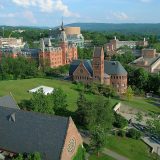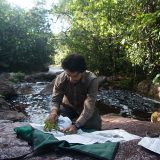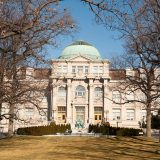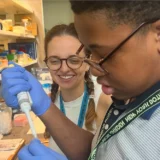
Graduate Studies Program and Science Internships
Commodore Matthew Perry Graduate Studies Program
The NYBG Graduate Studies Program trains Ph.D. and Master’s students in systematics, genomics, economic botany, and related fields such as forestry, ecology, bioinformatics, and conservation biology. The Program is operated in conjunction with City University of New York’s (CUNY) Ph.D. Program in Biology; Florida International University’s International Center for Tropical Botany; the Biology Department and Calder Center of Fordham University; the Department of Ecology, Evolution & Environmental Biology (E3B) at Columbia University; the Department of Plant Biology at Cornell University; the Biology Department at New York University (NYU); and The School of the Environment at Yale University. Students apply to and enroll at one of these universities and complete the degree requirements of the school, but have full access to the staff, facilities, and research opportunities available at the Garden.
In addition to core courses in plant sciences, New York City doctoral students can take courses in molecular biology, statistics, phytochemistry, the social sciences, or other disciplines at any affiliated campus in the NYC area. As a result, students have the opportunity to develop skills in a diversity of fields to design interdisciplinary research projects that revolve around plant science.
The New York Botanical Garden has one of the outstanding botanical libraries in the world, with more than 1.25 million accessions, a herbarium with over 7.8 million specimens, and 10,000 species of living plants housed in several greenhouses including the Enid A. Haupt Conservatory. Students also have access to the Laboratory for Integrative Biodiversity Research.
The name of the program honors Commodore Matthew Calbraith Perry’s contribution to botany. During the 1852-54 United States naval expedition led by Commodore Perry, Dr. James Morrow, the expedition’s agriculturalist, collected samples of plant life throughout Japan, including several type specimens representing taxa previously unknown to science. Today, a number of these specimens are housed in NYBG’s William & Lynda Steere Herbarium, where they are available for study by scientists.
Contact Lawrence M. Kelly (lkelly@nybg.org), Director of Graduate Studies, with questions or comments.





